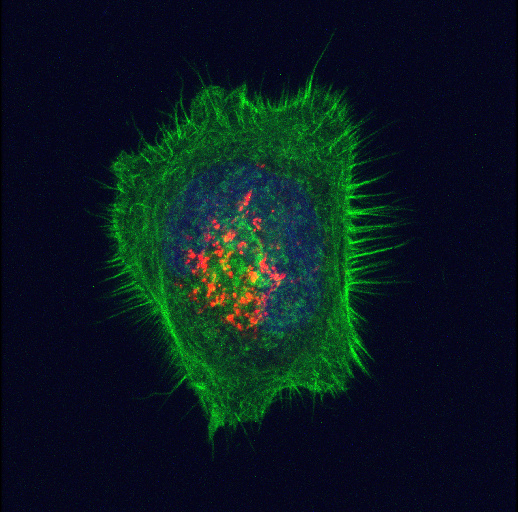
There are over 50 graduate faculty members constituting the University of New Mexico Cancer Center. These faculty and their trainees represent the next generation of cancer researchers charged with making cutting edge technological advances in genomics, imaging, molecular and drug discovery.
The flexible curriculum will enable students to choose from a menu of courses that offer training relevant to each of the four Cancer Center research programs: 1) Cancer Control and Disparities; 2) Cancer Genetics, Epigenetics and Genomics; 3) Translational Cancer Cell Biology and Signaling; 4) Cancer Biotechnology, Drug Discovery and Targeted Delivery. The concentration is designed to offer required and elective courses as well as professional career development that is relevant to all four programs, yet with sufficient flexibility to enable trainees to focus on selected areas of interest and be prepared to assume jobs in diverse cancer research job sectors.

The Ph.D. in Biomedical Sciences Cancer Biology concentration provides trainees with focused and individualized training in cancer-relevant disciplines. There are over 50 graduate faculty members constituting the University of New Mexico Cancer Center, which is an NIH-funded P30 Center with emphases on basic research, clinical translation and community studies. These faculty are extramurally funded and internationally recognized leaders in their fields and their trainees represent the next generation of cancer researchers charged with making cutting edge technological advances in genomics, imaging, molecular and drug discovery. The complexity of such medical advances also requires culturally sensitive community outreach and integration to assure that the dissemination of these advances will be effective and accepted by patients, caregivers and health care providers. In recognition of the need for greater interdisciplinary and transdisciplinary graduate training, the Cancer Biology concentration addresses new, national graduate training guidelines that require students to articulate individualized training goals and plans for targeted career development. The flexible curriculum will enable students to choose from a menu of courses that offer training relevant to each of the four Cancer Center research programs: 1) Cancer Control and Disparities; 2) Cancer Genetics, Epigenetics and Genomics; 3) Translational Cancer Cell Biology and Signaling; 4) Cancer Biotechnology, Drug Discovery and Targeted Delivery. The concentration is designed to offer required and elective courses as well as professional career development that is relevant to all four programs, yet with sufficient flexibility to enable trainees to focus on selected areas of interest. Professional and development activities afford training in grant writing, effective communication and presentation skills, entrepreneurship, and more. Trainees have opportunities to attend national conferences, be appointed to training grants, engage in teaching and mentoring others, and will be well prepared to assume jobs in diverse cancer research job sectors.
To earn a Concentration in Cancer Biology graduate students are required to take the following:
|
Course No. |
Course title |
Credit hrs |
|
|
REQUIRED |
|
|
BIOM 515 |
Cancer Biology |
3 |
|
|
|
|
|
|
Select 2 of the following: |
|
|
BIOM 509 |
Principles of Neurobiology |
3 |
|
BIOM 510 |
Physiology |
3 |
|
BIOM 514 |
Immunobiology |
3 |
|
MPHY 516 |
Fundamentals of Medical Imaging |
3 |
|
PHRM 576 |
Molecular and Cellular Pharmacology |
3 |
Following successful completion of the Qualifying Exam and remaining in Good Academic Standing (as defined by the BSGP), graduate training will mainly focus on laboratory research supervised by the student's mentor, and supplemented with the following advanced courses:
| Course No. |
Course title |
Credit hrs |
|
|
REQUIRED |
|
| BIOM 583 or BIOM 605 or BIOM 615 or PHRM 593 |
Seminar: Pathology Membrane Trafficking Seminar Seminar: Signal Transduction and Cell Adhesion Pharmaceutical Sciences and Toxicology Seminar |
4 |
|
|
|
|
|
|
Select 1 of the following: |
|
|
BIOM 505 |
ST: Biostatistics |
2 |
|
STAT 527 |
Advanced Data Analysis |
3 |
|
|
|
|
|
|
Select at least 6 credit hours of the following: | |
|
BIOM 505 or |
ST: with a Cancer Focus T: Cancer Focus |
variable |
|
BIOM 510 |
Physiology | 3 |
|
BIOM 540 |
University Teacher Training | 2 |
|
BIOM 616 |
Molecular Virology | 3 |
|
BIOL 547 |
Advanced Techniques in Light Microscopy | 4 |
|
PH 502 |
Epidemiologic Methods I | 3 |
|
PH 532 |
Cancer Epidemiology | 2 |
|
PHRM 536 |
Introduction to Pharmacogenomics | 2 |
|
PHRM 576 |
Molecular and Cellular Pharmacology | 3 |
|
PHRM 580 |
General Toxicology | 2 |
Course substitutions may be made with the prior approval of your Committee on Studies (COS).
Mailing Address
School of Medicine Research Education Office
MSC08-4560
1 University of New Mexico
Albuquerque, NM 87131
Phone: (505) 272-1887
Fax: (505) 272-8738
Email: SOMREO@salud.unm.edu
Physical Location:
UNM Health Sciences Center (North Campus)
Reginald Heber Fitz Hall (Building 211)
Room B61